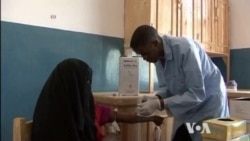Science seems to be finally starting to win in the war against the human immunodeficiency virus HIV that causes AIDS. But experts gathered at the Paris conference on the deadly disease say proposed cuts in global funding may delay the final blow.
It took three decades from the appearance of the first drug for slowing the onset of AIDS to today’s drug cocktails that save many of the infected patients from what was inevitable death.
The conference on AIDS, held this week in Paris, reflected optimism about new treatments and concern about proposed cuts in funding, especially by the U.S. government.
Paris mayor Anne Hidalgo highlighted the lack of funds.
“I want to remind you that $7 billion per year is still missing in the fight against AIDS in the world. This is the money we need to find. And thanks to our mobilization, we could assign it to the fight against AIDS,” said Hidalgo.
In spite of the latest advances, the virus that causes AIDS remains a formidable enemy due to its unprecedented ability to develop resistance to drugs.
New medicines keep it under control, but they are neither available nor affordable for many. Experts, such as the president of the International AIDS Society, Linda-Gail Bekker, also suspect a large number of unreported cases.
“We know we are treating 19.5 million people, but there's another 17-odd million who need treatment today and we haven't found those people. Many of them are in regions of the world such as West Africa, Central Africa, Eastern Europe, Central Asia, that we just haven't got to, so that's very concerning,” said Bekker.
However, UNAIDS executive director Michel Sibide sounded an optimistic note.
“We are reaching the people in need. We are saving lives. Because it's not only about proving that we can put people under treatment but also that we need to completely change the screening,” said Sibide.
Among the highlights is the recent news about a 10-year-old South African child born with HIV. After only a year of treatment, the child has been virus-free for more than eight years.
Citing other similar cases as well as the promising vaccines being developed, experts say the scales may finally be tipped against the disease that so far has killed about 35 million people.





